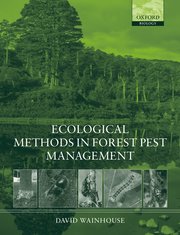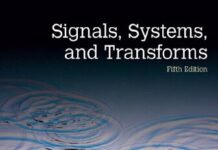| Book Name: | [PDF] Ecological Methods in Forest Pest Management by David Wainhouse |
| Free Download: | Available |
Ecological Methods in Forest Pest Management by David Wainhouse :: This book is about the management of forest pests and aims to provide a critical appraisal of the theory and practice of key methods of management. These include, for example, semiochemicals, biological or microbial control and plant resistance. The appropriate application of these ‘ecological methods’ in the development of Integrated Pest Management (IPM) programmes depends on a clear understanding of pest biology and population dynamics, as well as an appreciation of the ecology and economic importance of managed forests. The extensive management of forests is often contrasted with intensive management in agriculture where IPM programmes have the aim of reducing insecticide use. But in forestry, where chemical pesticides are much less commonly applied, the main impetus for the development of IPM comes from the need to use environmentally sensitive and sustainable methods of control appropriate to both semi-natural and plantation forests. Such forests are increasingly likely to be managed for multiple puposes. As well as timber production therefore, maintaining or enhancing biodiversity and providing for public recreation and amenity are likely to be important objectives of management.
Amajor theme throughout the book is that details of pest ecology and of forest ecology and management matter in the application of IPM. The general bias towards examples of IPM from north temperate forests largely reflects coverage in the literature. However the principles, and to a large extent the practice, are applicable worldwide. Books with a particular emphasis on tropical pests include Wagner et al. (1991) and Speight and Wylie (2001).
Forests in many countries have been altered by exploitation and management and by the increasing use of plantations of exotic species for wood production. The species composition, distribution and extent of forests and the way they are managed can have an important influence on the nature and severity of pest problems and these are considered in Chapter 1. The increasing use of plantations of non-native trees in different countries and the globalisation of trade have significantly increased the risk of introducing exotic pests. The devastating effects that such pests can have on these plantations has highlighted the importance of regulating international trade in plants and plant products, a subject considered in Chapter 2. Spatial and temporal variation in pest attack can occur on a local or regional scale. Differences in the age or species composition of forests or the direct effects of site and climate on both trees and pests can contribute to this variation and may be used in the development of indices of risk. Risk-rating of forests and monitoring of pest populations in those most at risk can provide an early warning of outbreaks. Chapter 3 explores such approaches to improving the effectiveness and efficiency of pest management in extensive forest areas.

Ecological Methods in Forest Pest Management by David Wainhouse
| Title: | Ecological Methods in Forest Pest Management |
| Editor: | David Wainhouse |
| Edition: | 1st |
| Publisher: | Oxford University Press |
| Length: | 249 pages |
| Size: | 4.03 MB |
| Language: | English |
Ecological Methods in Forest Pest Management PDF
Author(s): David Wainhouse
Year: 2005
ISBN: 0198505647
Related Results : ecological methods in forest pest management,
Related More Books
Thanks For Visiting Our Website https://www.freepdfbook.com To Support Us, Keep Share On Social Media.









![[PDF] Draw Buildings and Cities in 15 Minutes Draw Buildings and Cities in 15 Minutes pdf](https://www.freepdfbook.com/wp-content/uploads/2021/06/Draw-Buildings-and-Cities-in-15-Minutes-218x150.jpg)








![[PDF] Digital Image Processing An Algorithmic Introduction Using Java Digital Image Processing An Algorithmic Introduction Using Java](https://www.freepdfbook.com/wp-content/uploads/2022/06/Digital-Image-Processing-An-Algorithmic-Introduction-Using-Java.jpg)




![[PDF] 43 Years JEE ADVANCED + JEE MAIN Chapterwise & Topicwise Solved Papers 43 Years JEE ADVANCED (1978-2020) + JEE MAIN Chapterwise & Topicwise Solved Papers Physics PDF](https://www.freepdfbook.com/wp-content/uploads/2022/03/43-Years-JEE-ADVANCED-1978-2020.jpg)

![[PDF] Problems in Physical Chemistry for JEE (Main & Advanced) Problems in Physical Chemistry for JEE (Main & Advanced) Free PDF Book Download](https://www.freepdfbook.com/wp-content/uploads/2022/03/Problems-in-Physical-Chemistry-for-JEE-Main-Advanced.jpg)
![[PDF] Engineering Physics (McGraw Hill)](https://www.freepdfbook.com/wp-content/uploads/2021/05/bafc8c2685bb6823a9c56134f7fba5df.jpeg)

![[PDF] Engineering Chemistry By Shashi Chawla](https://www.freepdfbook.com/wp-content/uploads/2022/05/Theory-And-Practicals-of-Engineering-Chemistry-By-Shashi-Chawla-free-pdf-book.jpeg)
![[PDF] Chemistry: An Introduction to Organic, Inorganic & Physical Chemistry Chemistry: An Introduction to Organic, Inorganic & Physical Chemistry](https://www.freepdfbook.com/wp-content/uploads/2022/04/Chemistry-An-Introduction-to-Organic-Inorganic-Physical-Chemistry.jpg)
![[PDF] Essentials of Physical Chemistry Essentials of Physical Chemistry Free PDF Book by Bahl](https://www.freepdfbook.com/wp-content/uploads/2022/04/Essentials-of-Physical-Chemistry-bahl.jpg)
![[PDF] Biological control of plant-parasitic nematodes: soil ecosystem management in sustainable agriculture Biological control of plant-parasitic nematodes: soil ecosystem management in sustainable agriculture](https://www.freepdfbook.com/wp-content/uploads/2022/05/Biological-control-of-plant-parasitic-nematodes-soil-ecosystem-management-in-sustainable-agriculture.jpg)
![[PDF] Human Anatomy: Color Atlas and Textbook Human Anatomy: Color Atlas and Textbook Free PDF Book](https://www.freepdfbook.com/wp-content/uploads/2022/05/Human-Anatomy-Color-Atlas-and-Textbook.jpg)
![[PDF] Concepts of Biology Book [Free Download]](https://www.freepdfbook.com/wp-content/uploads/2022/05/Concepts-of-Biology.jpg)
![[PDF] Essentials of Biology [Free Download] Essentials of Biology Free PDF BOok Download](https://www.freepdfbook.com/wp-content/uploads/2022/05/Essentials-of-Biology-Free-PDF-Book-Downlaod.jpg)
![[PDF] Human Biology Book [Free Download]](https://www.freepdfbook.com/wp-content/uploads/2022/05/PDF-Human-Biology-Book-Free-Download.jpg)